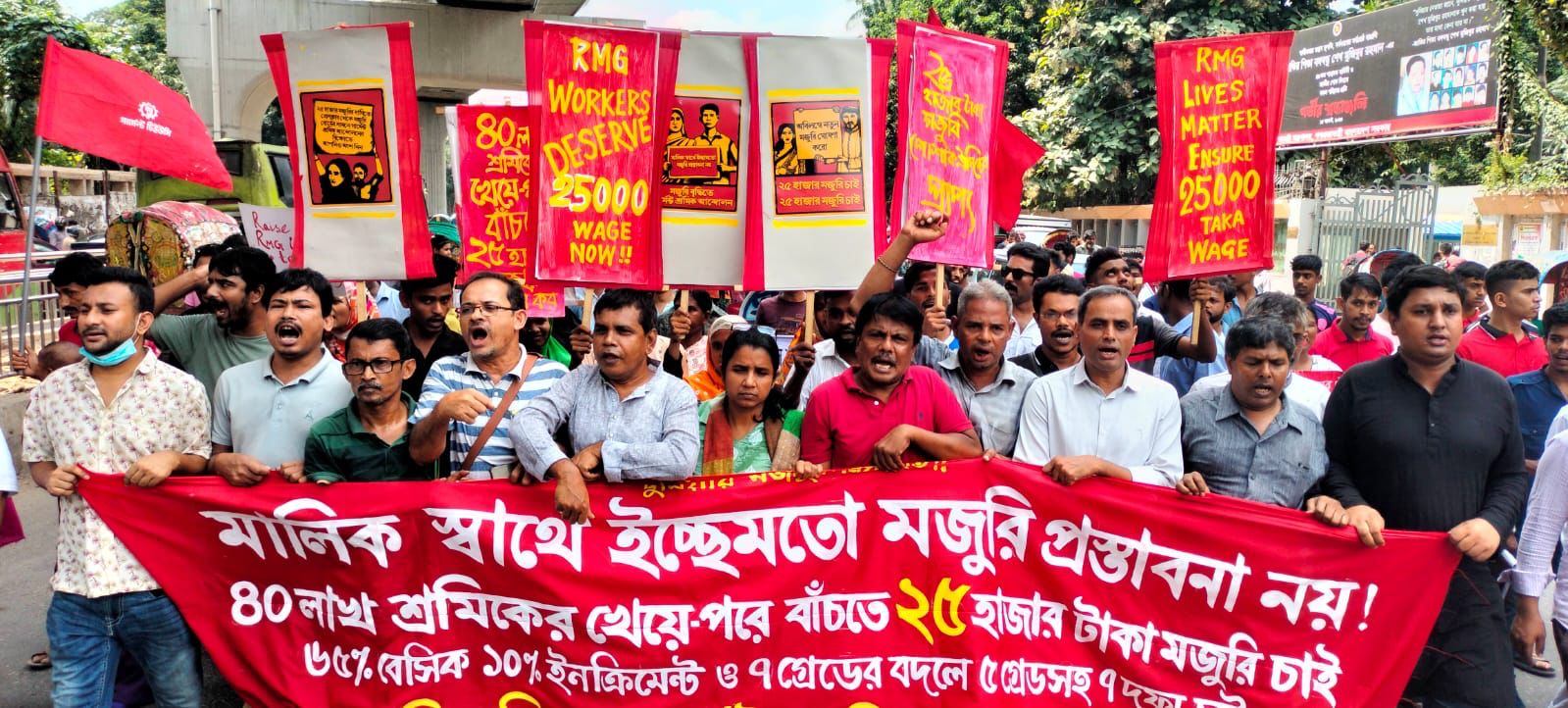
VANGUARD - Expressing the viewpoint of the Communist Party of Australia (Marxist-Leninist)
For National Independence and Socialism • www.cpaml.org
We have received a request from Bangladesh to support the struggles of garment workers. In the face of severe repression, including killings, they are demanding to be lifted above their poverty-level wages. According to Australian support group ActionAid, “the mainly women workers at the heart of the industry are routinely expected to work 12-to-16-hour days, six days a week in unsafe and exploitative working conditions.” Organisations such as Union Aid Abroad-APHEDA should take on working for the support of Bangladeshi’s exploited workers.
November 08, 2023
Minimum Wage Movement: 230 USD for a Month
International Call of Immediate Solidarity Action for the Struggle of Garment Workers of Bangladesh
The Garment Workers' Trade Union Centre (GWTUC), representing the interests over five million garment workers in Bangladesh, is a major global supplier of garments. They have called upon all stakeholders involved in the industry, both within and outside the country, as well as the government, to heed the demands of the ongoing movement for a minimum monthly wage of 25,000 BDT (230 USD now). This wage has remained stagnant at only 8,000 BDT (73 USD) for the past five years.
In support of the wage increase movement for workers in Bangladesh, the GWTUC calls on workers worldwide and the downtrodden to unite against the repressive owners and their government. During peaceful worker demonstrations, the government resorted to violence. Despite being the primary clothing supplier to the world, Bangladesh’s garment industry workers receive the lowest wages globally. Foreign buyers and multinational corporations in this supply chain should be held accountable. Simultaneously, the GWTUC calls upon the autocratic government of Bangladesh to stop now the human rights violations, surveillance through cell phones and social media, the killing of unarmed civilians, and the false cases and trail against trade union leaders. The world is urged to raise their voice against these injustices, and GWTUC represents this perspective.
The current wages make it nearly impossible for workers to make ends meet, and all stakeholders, including local owners, international retail brands, and other supply chain beneficiaries, should take a humane and sensitive approach to safeguard the lives of these workers who power the apparel industry.
Bangladesh ranks as the world's second-largest apparel supplier, with major brands like Adidas, Gap, Calvin Klein, H&M, Giorgio Armani, Ralph Lauren, Hugo Boss, Nike, and Tommy Hilfiger manufacturing their products here. However, Bangladeshi workers receive the lowest wages among their global counterparts.
Workers have been submitting demands to the government for nearly three years, and they are now initiating activities to increase their wages. The latest protest erupted when employers proposed a minimum wage of only 10,400 BDT.
Protests for a higher minimum wage began on October 23, as it was revealed that the wage would increase to only 10,400 BDT per month, effective from December. As in the past, protests led to confrontations with the police and hooligans affiliated with the ruling party.
In three separate industrial areas, the police are using force to suppress extensive worker protests. They are arresting hundreds of workers and filing false cases against thousands of workers, including trade union leaders.
So far, at least five workers have been killed due to police and ruling party hooligans' torture. One of them, Rasel Hawladar, was shot from a point blank range and killed at 30th October. A worker named Imran died in the fire on the same day. These protests have now spread to various industrial areas, and violence and oppression continue. Workers have gone on strike and ceased working in factories. Unable to force them back to work, factory owners are now seeking negotiations with worker representatives, including those from the Garment Workers’ Trade Union Centre. Among all these, on November 8, the government has proposed a minimum wage of 12,500 BDT for the workers. The workers rejected the proposal and announced to continue the movement. Workers refuse to return to work with the proposed minimum wage. In response, the ruling party and factory owners are jointly threatening local union leaders, hinting at the possibility of arresting and imprisoning these leaders if the strike persists. On November 8, police fired at a workers rally again and killed another woman worker, Anjuara Khatun.
The government is in discussions with GWTUC on one hand. On the other hand, various false allegations are being rapidly processed against the top leadership of GWTUC, including Vice President Joly Talukdar, General Secretary Sadekur Rahman Shamim, and Deputy General Secretary Monzur Moin. Due to the judiciary's complete dependence on the government in the current governance system of the country, GWTUC is calling on the global community to stand against the unjust incarceration of top trade union leaders again for an extended period. Additionally, GWTUC are asking to the working class of the France to raise their voice in protest of the act by the French government, for serving Bangladeshi autocratic government by giving aggressive surveillance technology which is barbarically using against human rights activists, trade unionist and democratic movement. They have urged people around the world to join this cause.
The garment workers of Bangladesh are demanding a minimum monthly wage of 25,000 Bangladeshi Taka and are struggling against the factory owners. Despite facing various atrocities, the movement continues. We call on all of our fraternal trade unions to stand in solidarity with the ongoing movement of the workers in Bangladesh.
Workers of the World, Unite!
Long live, Internationalism and Solidarity!
Thank You
Maria Ferdawsi
International Affairs Secretary
Garment Workers’ Trade Union Centre, Bangladesh
Further reading and links:
http://Anjana's Story - ActionAid Australia
http://Our Projects | Union Aid Abroad-APHEDA